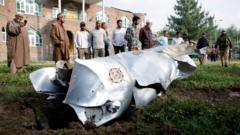### Summary: In a groundbreaking development, India and Pakistan have engaged in what experts are calling the world's first drone war between two nuclear-armed nations. With both sides accusing the other of drone attacks and missile strikes, the conflict is escalating rapidly, raising concerns over potential broader repercussions in the region.
### Title: Escalating Tensions: The Emergence of Drone Warfare Between India and Pakistan

### Title: Escalating Tensions: The Emergence of Drone Warfare Between India and Pakistan
### Description: South Asia witnesses its first drone war as India and Pakistan exchange aerial strikes amid rising hostilities.
The ongoing rivalry between India and Pakistan has entered a perilous new phase, marked by the use of drones, as both nations accuse each other of conducting strikes across their contested border. On Thursday, India claimed Pakistan launched drone attacks against military installations in Indian-administered Kashmir, a claim that Islamabad quickly countered. Pakistan retaliated, asserting its defense forces had intercepted 25 Indian drones, while India refrained from public comments regarding these accusations.
Experts note the situation marks a significant escalation in the historic India-Pakistan conflict, as both countries employ unmanned aerial vehicles (UAVs) instead of conventional artillery. With figures like Jahara Matisek from the US Naval War College weighing in, the evolving military strategies embody a shift towards drone warfare, posing increased risks of escalation in an already volatile environment.
Recent exchanges have not only resulted in tragic casualties on both sides—36 deaths reported on the Pakistani side and 16 civilians killed in India—but they also raise serious questions about the future of military engagement between these nuclear powers. The escalation began following a militant attack that India attributes to Pakistan, an allegation strongly denied by Islamabad.
India's drone capabilities, primarily sourced from Israel, have increasingly become critical in its military operations. The establishment of a deal with the United States for advanced MQ-9B Predator drones further amplifies its capacity for precision warfare. Conversely, Pakistan's drone forces incorporate a mix of domestic and international platforms, including advanced Chinese and Turkish technology.
While drone warfare brings new tactical possibilities to the conflict, experts caution that these recent actions might merely represent an initial skirmish rather than a full-scale conflict. The potential for further escalation remains unpredictable, dependent on responses from both sides and the involvement of international powers urging restraint. Ultimately, analysts believe these developments represent a broader arms race that could reshape military operations in the region and beyond.
The stakes are high, as the approach to drone warfare in South Asia diverges from other global conflicts, emphasizing a new and uncertain chapter in the ongoing saga of Indo-Pak relations.


















